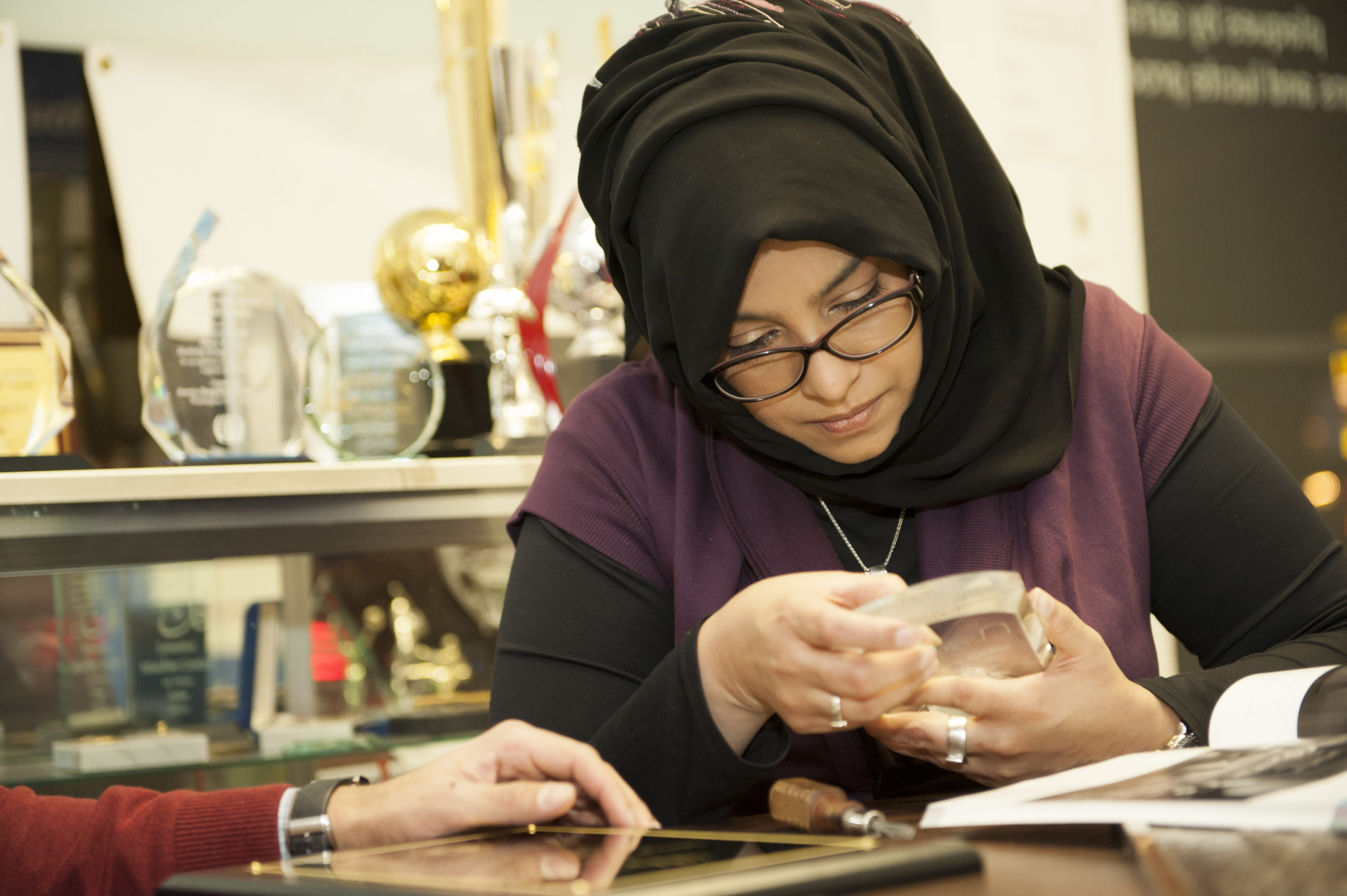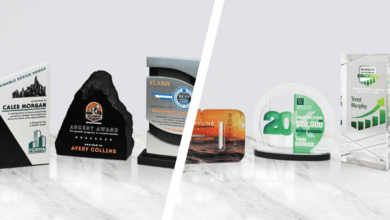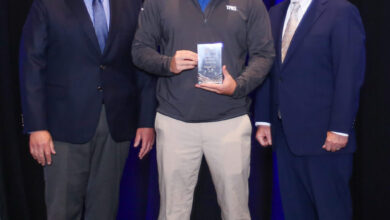Owner of Plaques by Azra Aims to Empower Entrepreneurs of Color
For Azra Khalfan-Kermali, owning a business is about more than producing orders and creating happy, returning customers
For Azra Khalfan-Kermali, owning a business is about more than just producing orders and creating happy, returning customers. It’s about continuing her family’s legacy, fully leaning into her role as a woman of color entrepreneur, and helping other woman entrepreneurs with resources.
Khalfan-Kermali owns and operates Plaques by Azra, a custom awards, plaques, and banners business, founded by her parents when she was born in the early 1970s.
“My mom was the sole owner, and my father wanted it named after me,” she explains of the name.
So, how did she get involved in the family business?
She recalls, “Growing up, I watched them either after school or during holidays. During the mid-90s, I was enrolled in college and saw my father was struggling with the workload. I asked him to teach me engraving on the Hermes 1218 rotary engraver. Since I knew how the pantograph engraver worked, I quickly grasped the new technology. The transition meant learning and taking over one skillset at a time. I was ambitious and also loved the flexibility between studies and work. In my classes, I felt the experience I had at work placed me ahead of my peers.”
Although she stepped up to help the family business where she could, she didn’t anticipate taking it over in 1996. In fact, Khalfan-Kermali tells GRAPHICS PRO she had “very different plans.”
At the age of 18, when she says most of her friends were off to college, she packed her trousseau and hopped on a flight to Tanzania. A year later, she became a mother and took time to focus on her family.
“I had no idea that my life would take so many unexpected turns, and I would end up right back to NY enrolling into college,” she states. “My older brother was very involved, but around 1996 he decided to branch out on his own. I knew very little about operations, but due to the circumstances, I had to learn.”
She continues, “It was challenging to fill his shoes, especially because some of the equipment seemed daunting. In a small business like ours, I had to know how to operate them all, including a giant foot shear. It was my least favorite and a complete eyesore. Now, almost 25 years later, I am having trouble letting go of that rusty chunk of iron. To overcome those challenges was truly very liberating.”
When it came to running the business that first year, she says the transition went smoothly. She gradually grew into the role as her parents watched and guided her without being overbearing or micromanaging.
Helping other entrepreneurs of color
Now, 25 years later, Khalfan-Kermali runs a successful customization business and aims to empower and guide other entrepreneurs of color on their journeys by providing practical advice and sharing her personal story.
Most recently, Marsha Guerrier, HerSuiteSpot founder and bestselling author, chose Khalfan-Kermali to be part of “Pathways to HerRise,” an anthology presented by Guerrier.
“Pathways to HerRise” shares the personal stories of nine women of color entrepreneurs whose businesses have been affected by COVID-19. The authors, including Khalfan-Kermali, provide a telling of the obstacles they’ve faced and successes they’ve seen while offering advice to readers on breaking barriers to success.
“Just like many businesses, we were hit badly,” says Khalfan-Kermali of COVID-19’s effects on Plaques by Azra. “Our entire peak season was canceled. Elmhurst was the epicenter, and to be honest, every day, I kept positive by being grateful that my family was OK.”
She continues, “I knew that a global pandemic meant we had to make some major adjustments and seek funding to survive. I am grateful for all the resources that have surfaced. My positivity allowed me to pivot toward something very exciting, something that is purpose-driven, makes a direct impact on the economy, and has a component of giving back to those organizations that have given me a voice.”
With more details to come on this new venture, she tells GRAPHICS PRO of an employee-engagement program in the works, as well as her support and use of small businesses within her supply chain.
When asked how she overcame the challenging times of the last year, she says faith, support of her family, being open-minded, asking for help, and funding all played a large part.
She also realized there were two things no one could ever take away from her, even in the hardest of times: knowledge and experience. And for other business owners who may be facing financial struggles, she offers some words of encouragement: “Your knowledge and experience will always be with you.”
With her chapter in “Pathways to HerRise,” Khalfan-Kermali highlights the hardships she’s faced as a woman of color who openly identifies as an observer to the Islamic faith.
“Once I embraced my identity, I ran with it,” she explains. “I hope that the many women who have started their businesses during the pandemic can learn to turn off the negativity, impostor syndrome, and follow their passion.”
She also mentions her desire to be the change. “If I want to see a better world, I need to make it a better world. The work starts within,” she affirms.
Khalfan-Kermali says Guerrier, the book’s publisher, hopes the collection of stories serves as a resource to motivate others in their careers and business. As Khalfan-Kermali reflects on her over two decades as a business owner, she shares some big lessons she’s learned along the way:
“It is better to collaborate than to compete. In collaborating, everyone is a winner.”
“Relationships are so important, whether they are with the customers, employees, or suppliers. I cannot emphasize enough.”
“It took a while, but finally, I believe it is better to lease equipment or take loans to allow a healthy cash flow.”
For more advice like this, look out for “Pathways to HerRise,” which launches on International Women’s Day—March 8. eBooks and paperback versions are available via Amazon.
Other resources Khalfan-Kermali finds helpful include the National Minority Supplier Development Council (NMSDC), an organization that connects minority-owned businesses with corporate America, and the Tory Burch Foundation. She says the Tory Burch Foundation has uplifted her for the last eight years through support with networking opportunities, entrepreneurial education, and access to funding.




